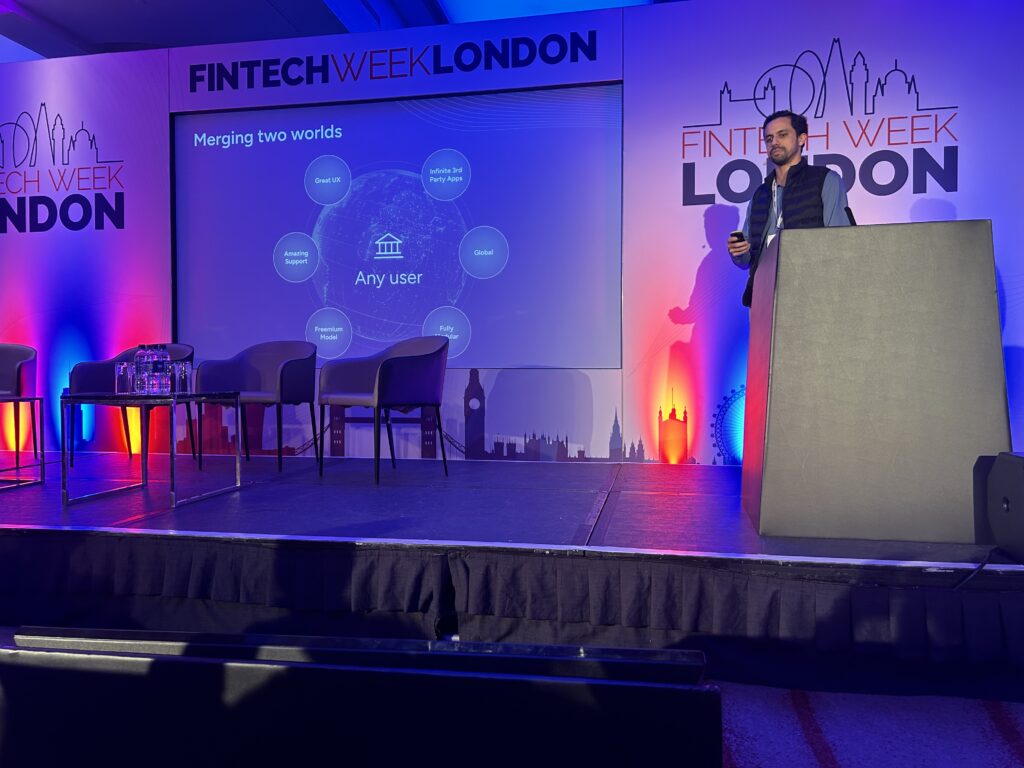From AI to inclusive finance – Fintech Week London round-up
Fintech Week London returned for its fourth consecutive year, spotlighting London’s cutting-edge fintech innovations.
-
Marina Mouka
- June 14, 2024
- 8 minutes

This year’s Fintech Week London, hosted at the Park Plaza Victoria, was a vibrant hub of innovation and forward-thinking. Uniting over 1,000 senior decision-makers from leading fintech companies, banks, investment firms, and regulatory bodies, the flagship conference highlighted the most pressing themes in fintech through keynotes, panel debates, workshops, and networking sessions that highlighted the sector’s dynamic nature.
The event showcased London’s pivotal role in the global fintech landscape and explored how the industry can drive forward through inclusivity, robust legislation, and cutting-edge technological advancements.
Inclusivity takes centre stage
Inclusivity was a major theme right from the opening remarks. Raf De Kimpe, CEO of Fintech Week London, set a collaborative tone by urging the fintech community to embrace diversity. His call for “zero tolerance for exclusion” set the stage for the discussions to follow. De Kimpe highlighted the importance of bringing together diverse perspectives to drive innovation and ensure the fintech ecosystem remains vibrant and forward-thinking. “Innovation thrives on diversity,” he noted, emphasising how varied viewpoints and inclusive practices can spark groundbreaking ideas and sustainable growth.

Howard Dawber, Deputy Mayor of London for Business and Growth, celebrated London’s significant influence in the global fintech arena. He noted that London boasts the largest concentration of fintech organisations in Europe and attracts more investment than any other European city. “We intend to be the number one fintech hub and the number one tech cluster in the world,” Dawber said. He emphasised that London has been a leader in financial innovation for centuries, shaping global finance and setting standards that others follow. Dawber’s vision was clear: a future where London continues to be the epicentre of fintech advancements, fostering an environment where diversity and inclusivity drive innovation forward.
The future of finance is bright
A major takeaway from the conference was the crucial role of legislation in fintech progress. Lord Chris Holmes, MBE MP, highlighted the need for comprehensive legal frameworks around digital identity and AI. “We need robust digital identity systems and ethical AI legislation,” Holmes stated, stressing that proper regulations are vital for fostering innovation while maintaining ethical standards. He underscored the balance between innovation and regulation, urging lawmakers to create environments where technology can thrive responsibly.

Charlotte Crosswell, Chair of the Centre for Finance, Innovation and Technology (CFIT), painted a hopeful picture for the next decade, predicting it to be the most transformative for financial services. “We haven’t seen yet the decade of innovation that will be the most transformative,” she noted. Crosswell highlighted how better data usage could significantly improve financial services, especially for SMEs, boosting economic growth and financial inclusion. She emphasised the potential of new technologies to make financial services more accessible and efficient, stressing the importance of cross-sector collaboration to drive meaningful change and innovation.

The evolution of banking: From traditional to decentralised
Breno Maximiano, Head of Strategy at Gnosis Pay, introduced the concept of Banking 3.0, focusing on user-controlled finances. “We are entering Banking 3.0: the ownership era, where users start banking without the bankers,” he explained. This new phase centers on decentralisation and user empowerment, challenging traditional banking models and promoting personal control over financial assets. Maximiano’s insights suggested a future where the traditional banking structure is disrupted, leading to a more inclusive and user-centric financial ecosystem. He discussed how this shift could result in greater transparency, lower costs, and increased access to financial services for all.

Digital assets: Permanent fixtures in finance
Digital assets were a hot topic at the conference. Saif Malik, CEO of Standard Chartered UK, highlighted the permanence and potential of digital assets in transforming financial services. “We are witnessing a seismic shift,” he said, referring to the rise of cryptocurrencies, blockchain technology, and tokenised assets.
Malik discussed the opportunities these technologies present in enhancing liquidity and accessibility, despite challenges like regulatory uncertainty and security concerns. “The momentum towards digital assets is undeniable,” he concluded. His commentary painted a picture of a future where digital assets are integral to financial systems, driving innovation and new investment opportunities. Malik emphasised the need for robust regulatory frameworks to ensure the safe and sustainable integration of digital assets into the global financial ecosystem.

Embedding finance in daily life
The concept of embedded finance emerged as a significant trend, showing how financial services are becoming seamlessly integrated into everyday activities.
David Jarvis, CEO of Griffin, explained this well when he said, “Life doesn’t happen at the bank; life happens everywhere else.” This integration means financial services are more accessible at the point of need, enhancing user experience and extending services to underserved populations. Jarvis’s insights suggested a future where financial services are so seamlessly integrated into daily life that they become almost invisible, yet essential. He discussed how this trend could democratise access to financial products and services, particularly in emerging markets and underserved communities.

Data, risk, and fraud
Navigating the digital landscape of data, risk, and fraud was another critical theme. The panel, moderated by Gina Clarcke, included insights from Karen Zhang, Fintech Lead & VC Partnerships at Google Cloud UKI, and Zahra Shah, Senior Board Advisor and Co-Founder at NexaQuanta.
Zhang stressed the link between data proliferation and fraud. “There’s innately a correlation and causation happening between all three factors,” she noted. Shah highlighted the importance of robust data management practices to prevent breaches and fraud, emphasising that “data is the most important asset of an organisation.” The discussions highlighted the need for continuous innovation in data security to keep pace with evolving threats and regulatory requirements.

The panel also discussed regulations such as the EU AI Act and the upcoming DORA regulation. “Regulations can actually be accelerators of innovation,” Zhang explained, emphasising that they ensure startups are built with scalability and resilience in mind. This perspective underscored the idea that thoughtful regulation can provide a solid foundation for sustainable innovation, ensuring that new technologies are implemented safely and effectively.
Customer centricity: The key to loyalty
The importance of customer centricity was a recurring theme. The panel featuring Saira Khan, Head of Innovation and Partnerships at First Direct Bank (HSBC), Meaghan Johnson, a seasoned fintech consultant, and other industry leaders noted that building loyalty hinges on delivering great customer experiences.
“Customer centricity is building loyalty with a great experience,” Khan stated. This focus on understanding and meeting customer needs is central to modern financial services, where user experience often dictates success. The discussions suggested that the future of finance will be increasingly driven by a deep understanding of customer needs and a commitment to delivering seamless, personalised experiences.

Women in fintech inspiring inclusion
The Women of Fintech panel celebrated the achievements of women in the industry and discussed the importance of inclusion. Lucy Heavens, VP of Marketing at Salv and Ambassador for Women of Fintech, stressed the need for continuous support for women at all career stages.
“When I talk about diversity and inclusion, I always have two paths,” Heavens said. She shared her passion for driving change through conversations about diversity and the importance of mentorship. The panelists, including Tiffany Appiah, Fintech Enthusiast and Podcast Host, Alexandra Chirica, Founder of Recfindr, and Caroline Ericsson, UK Head of Marketing and Communications at Former ABN AMRO Bank, shared their personal journeys and emphasised the importance of community support in fostering a more inclusive fintech industry.
“Creating a space where everyone feels valued and empowered is essential,” Heavens concluded. The discussions highlighted the critical role that diversity and inclusion play in driving innovation and creating a more equitable industry.

AI in payment services
Nicolas Kalokyris, Lead Lawyer at DLA Piper UK LLP, discussed the growing use of AI in payment services. He highlighted the benefits of AI, including cost reduction, process automation, and improved risk management. “AI provides many advantages in the financial services sector,” Kalokyris stated, emphasising its role in enhancing productivity and profitability.
Kalokyris also addressed the legal and regulatory requirements associated with AI, particularly in fraud management and transaction monitoring. He underscored the importance of ethical AI practices to ensure trust and transparency in financial services. The discussions highlighted the transformative potential of AI in making financial services more efficient and secure, while also emphasising the need for responsible implementation.

International payments: Bridging global financial gaps
A panel on international payments, featuring Nicola Marins, Senior Sales Manager at Paysafe, Dr. Stephen Oluwatobi, Operations Lead at Kora, Breno Maximiano from Gnosis Pay, and other industry leaders, discussed the G20 roadmap for cross-border transactions. The panel highlighted the challenges and opportunities in creating seamless global payment systems. “Payments are the gateway into fintech,” said Liz Lumley, Deputy Editor of The Banker.
The discussion underscored the need for robust infrastructure and innovative technologies to facilitate seamless cross-border payments. The insights suggested a future where international payments are faster, more reliable, and more inclusive, supporting global economic growth.

Reflecting on Fintech Week London 2024
Fintech Week London 2024 underscored that the future of finance is bright, dynamic, and inclusive. The discussions and insights provided a clear vision of how innovation, collaboration, and inclusivity will shape the financial landscape. London remains at the heart of this transformation, leading the charge in fintech innovation.
As the conference drew to a close, it was evident that the ideas and strategies discussed will significantly influence the industry’s trajectory in the coming years. The commitment to fostering a more innovative and inclusive financial ecosystem was palpable, promising a decade of significant growth and transformation for fintech. The themes of inclusivity, robust legislation, customer centricity, and the integration of advanced technologies like AI and digital assets painted a comprehensive picture of the future of finance.


 Bobsguide is a
Bobsguide is a